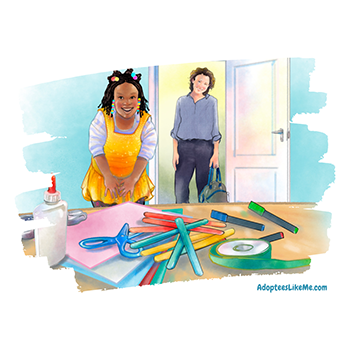What Does Play Therapy with an Adoptee-Therapist Look Like?
 If you haven’t engaged in therapy before, it can feel like a mystery. Making the decision to begin therapy might produce feelings of nervousness, trepidation, and uncertainty. This may be especially true if you are the parent or caregiver of an adoptee, and you are seeking adoption-informed therapy for the first time.
If you haven’t engaged in therapy before, it can feel like a mystery. Making the decision to begin therapy might produce feelings of nervousness, trepidation, and uncertainty. This may be especially true if you are the parent or caregiver of an adoptee, and you are seeking adoption-informed therapy for the first time.
In my debut children’s book, Marie Discovers Her Superpowers, you have the opportunity to join a young adoptee in her therapy session with me; below, you’ll find the guidelines I give to the caregivers of all of my young adoptee clients, which outlines the therapy process, expectations, and guidelines. I hope that this will demystify some of the therapeutic process for you.
(Note that this is my personal approach to play therapy and child counseling, so it may differ somewhat from other adoptee-therapists, but this will offer a general idea of the process you can expect.)

Marie begins therapy with Dr. Chaitra in MARIE DISCOVERS HER SUPERPOWERS
Understanding Play Therapy
- Play is the natural language, communication, and learning resource for children.
- Play therapy provides a safe, neutral environment for children to express their thoughts, feelings, and ideas; they do not have to be concerned with receiving approval, disappointing, or hurting the important people in their lives.
- The child is “in charge” in sessions, though the therapist will maintain boundaries around physical and emotional safety. Being “in charge” means that your child has the opportunity to choose activities, decide rules of games, decide how to label items (i.e. a marker might be labeled as a rocket ship), etc.
- Reflection statements and observations are the main tools of communication; very few questions will be asked. This gives your child space to feel heard, validated, and empowered in their abilities.
- There is not an overt agenda, goal, or activity that needs to be completed in each session; instead, the goal is to gain insight into your child’s thoughts, feelings, beliefs, and experiences in order to better understand and support their needs.
- Rewards for positive behavior are mainly intrinsic; there are no sticker charts, behavioral plans, prize jars, etc.
- Play therapy provides a healthy avenue for experimentation with new behaviors, interactions, and coping tools that can be applied to everyday life.
- Progress toward treatment goals will be measured by areas such as:
- “First times” with desired behaviors and coping strategies
- Significant changes in patterns of play and discontinued play involving unhealthy coping strategies or maladaptive behaviors
- The ability to engage in organized storylines of play
- Increased comfort speaking directly about difficult emotions and situations
- More appropriate acceptance and follow-through of boundaries and rules
- Improved ability to accurately identify and appropriately express emotions
- Utilization of effective communication skills
- Increased ownership over decisions and actions
- Improved cooperation and empathy
- Greater problem-solving and flexibility in thinking
- Lower frequency of regressive behaviors and interactions
- Decreased dependence on therapist
Understanding Caregiver / Parent’s Role in Play Therapy
- Provide your child’s therapist with relevant information about their history, current incidents, and upcoming events/changes so that their play can be interpreted within a clear and accurate context.
- Provide your child’s therapist with updates on their progress in relevant environments, so that the decision to work toward closure of treatment can be collaborative and therapeutically appropriate.
- During session times, talk “to” your child, not “about” your child. Discussions about billing, scheduling, recent incidents, therapeutic progress, etc. should occur within an appropriate parent-therapist communication method, such as by phone or through the secure messaging portal.
- Your child will typically be in charge of deciding whether to have a parent join sessions; the therapist will also make this decision at times when it is therapeutically necessary.
- When you join your child in sessions, utilize reflection statements instead of questions, curiosity instead of correction, and cooperation instead of instruction.
- When you are not in sessions, greet your child after sessions in the waiting area with “Welcome back! I missed you! I’m so glad to see you!” Avoid asking questions about what they said or did or whether they had fun. You will receive information from the therapist about each session, and we do not want to place unnecessary pressure on your child to feel they have to remember and explain everything about the session to you.
- Follow the therapist’s lead in sessions in regards to observations, reflections, play activities, and boundaries. At first, you will be in the background as more of an observer to the therapist-child interactions, and as your skills grow, you will transition into the forefront with parent-child interactions, while the therapist moves into the observer role.
- Allow your child to transition out of sessions WITHOUT cleaning up the play therapy room, so that they may express themselves more genuinely and freely, and so that the therapist can more easily prepare the room for the next session.
Therapist’s Role in Play Therapy
- Provide a safe space for your child to express themselves.
- Encourage your child to take the lead in session activities, while maintaining the appropriate emotional and physical boundaries to ensure the safety of everyone in the room.
- Assess and distinguish between times when play is literal vs. representative of real-life experiences.
- Compassionately observe and reflect upon your and your child’s feelings, body cues, choices, opportunities, decisions, actions, limitations, efforts, and successes.
- Gently challenge your and your child’s unhealthy or harmful perceptions, choices, and behaviors through structured and unstructured avenues of play.
- Provide honest feedback as you and your child experiment with different ways of interacting with the world through play, so you are both able to effectively apply healthier coping and communication skills in your daily lives.
- Facilitate relevant psychoeducation and support to parents to assist the child/family in meeting agreed upon treatment goals.
- The therapist will send caregivers/parents a message in the secure portal that describes session themes and feedback about areas to work on with your child at home; this summary will be sent both when you are directly involved in a session and when you remain the waiting area throughout a session.
- Confidentiality is an important part of counseling that looks slightly different in child counseling situations, because guardians are privy to all information shared in their child’s sessions. You can sign a release of information form if you would like other important adults in your child’s life to know more about what happens in their sessions. If I suspect or if your child discloses any abuse or neglect, I am obligated to report this to the proper authorities to ensure safety. Additionally, if your child seems to be in danger of harming themselves or someone else, I would report this to you and/or the proper authorities, and provide you with information about how to proceed in order to preserve the safety of all individuals involved.
If you would like to seek out an adoptee-therapist to work with your young adoptee, please visit my National Adoptee-Therapist Directory to search for a provider in your area. If you’d like more specific tips and talking points for Marie Discovers Her Superpowers to engage in deeper discussions with your child, be sure to download the free, printable Parent Resource Guide.
